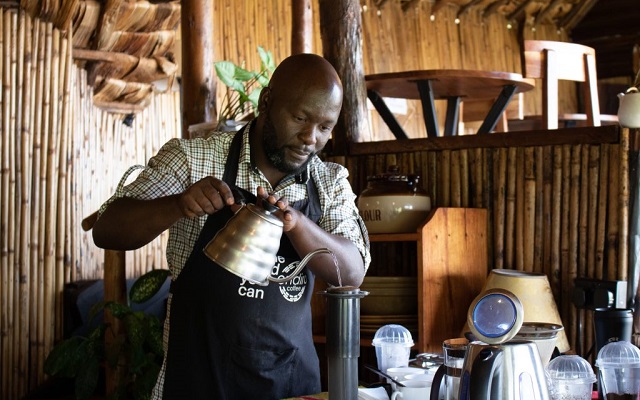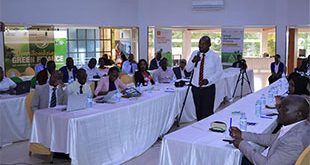
A new thrust to cultivate and promote the much-prized single-origin Arabica coffee, which thrives at high altitudes, could provide a powerful shot for Uganda’s coffee sector.
Kampala, Uganda | THE INDEPENDENT | High up on the slopes of Mount Elgon in the Bulambuli District, lies Kikobero. The small village is home to Kikobero Coffee, one of the country’s new specialty coffees company trying to stake its claim as being among the world’s highest quality beverage providers.
Martin Nangoli, the founder, invites us to his mother’s house. It is here, he says, that the foreign business partners he had invited for lunch a few years earlier first tried his mother’s coffee and remarked on its uniqueness.
Nangoli and other smallholder farmers cultivate the much prized single-origin Arabica variety which thrives at altitudes above 1,500 metres. Although Uganda is believed to have originated the Robusta variety of coffee – now widespread throughout the world – it is Arabica, with its smoothness and rich, full flavour that fetches the best prices in the world’s quality coffee markets.
After sharing a warm meal of matoke plantain, chicken and avocados, he shows us the coffee trees that “are older than my father” lining the garden. In the Masira sub-country where Kikobero is located, coffee cultivation has a long history as part of a mixed garden farming tradition but Martin says it took a trip to the UK following the visit by his overseas partners, to open his eyes to the full revenue earning potential of the crop.
He shared his discovery with his community and today, the export of coffee beans forms around 90% of the income source for the village with less than 10% coming from other fruits, vegetables, and animal products.
With the revenue gained from the coffee, Martin Nangoli has set up two schools in the area, a remarkable feat for a location so far from the larger town of Mbale. The plant itself has become an important part of the children’s education.
The village chief, Peter Masaba, shows us two coffee trees near the school. One of these trees has deliberately not been fed with fertiliser, and it is weak. Another gets fed regularly and is blooming brightly. This shows the children not only what happens when you do not take care of the tree, but also what happens when you do not adequately feed the mind. The children are learning from a young age how to plant and take care of seedlings, something that will help them if they pursue agricultural schooling later on.
Kikobero is one of a growing number of co-ops that have discovered the value of cultivating Arabica coffee at higher altitudes. This has brought a sizeable new cohort of farmers to the country’s traditional coffee cultivation of Robusta at lower levels.
The seedlings have been provided for free by the Ugandan Coffee Development Agency (UCDA). Formed in 1991, the agency has been actively working to “improve the marketing of coffee in order to optimise foreign exchange earnings for the country and payments to the farmers”.
Uganda is still largely an agricultural country. Coffee, forming around 22% of its total agricultural exports, is its most important cash crop and 1.9m households in Uganda depend on coffee directly or indirectly.
Dramatic rise in exports
There has been a dramatic rise in Uganda’s coffee export revenues – it exported 6.26m 60kg bags earning $862.28m in 2022 compared to $559.16m in the previous year. This was the highest figure ever achieved in any one year and has sharpened ambitions to raise the bar even further. The plan is to increase production to 20m bags by 2030 with projected earnings of around $2.5bn.
Dr Emmanuel Iyamulemye, the managing director of the UCDA, says that value addition in Ugandan coffee either as roasted beans or as instant coffee is vital in promoting the Ugandan brand out into the world. Uganda has struggled to promote its value addition coffee to Western markets due to high taxation fees slapped on value-added coffee.
Last year, Uganda stepped out of the International Coffee Organization (ICO) and Uganda’s President Yoweri Museveni called “a slave organisation”. The government cited “restrictions on exporting processed coffee” and “unfair tariffs” as two of their seven reasons for leaving the ICO.
Iyamulemye believes the African Continental Free Trade Agreement (AfCFTA) and specifically the Inter-African Coffee Organisation has remarkable potential to expand the markets for Ugandan coffee. He says “We are currently looking at trading products internally with 0% tariffs.”
The UCDA is specifically looking to trade in Northern African countries, such as Egypt, Morocco, and Algeria.
Expanding the domestic market
Milly Drijaru is a quality-controller who has been a part of Endiro Coffee since it was founded by Gloria Katusiime in 2011. Endiro, a complete tree-to-cup operation employing 518 Ugandan women, has recently made a deal to stock their excellent coffee in US grocery chain Trader Joe’s all over the US Midwest. Endiro profits go towards the fight against child vulnerability.
Drijaru and farmer Alice explain how vital it is that the women are employed directly: since land in Uganda is traditionally owned by men, “women would be working in the farms all day… but the men would spend it on drink. Now the woman takes care of it, she uses it for her children, and she keeps the money.”
Although coffee growing has been a Ugandan tradition for a long time, it has been regarded merely as a cash crop for the use of others and local consumption is limited. Endiro Coffee is trying to change this trend and appeal to the growing middle class by opening specialty coffee shops all over the country.
They prepare own-brand lattes, flat whites and other varieties with names such as “You Fil Dis Mocha” and “Flava In Da Caramel and Vanilla Latte”. They have also recently signed a collaboration agreement with Shell petroleum, which will begin selling their coffees at service stations.
Similarly, Mountain Harvest Coffee, which works with 36 groups of smallholder farmers on Mount Elgon, is targeting an expanded domestic market. At a visit to one of the smallholder farms, Kenneth Barigye, managing director at Mountain Harvest, asks his farmers how many of them drink coffee. Almost all hands shoot up in the air. “Good, good,” Barigye says, “an improvement.”
Mountain Harvest Coffee is keen to expand locally and into other African nations, and aims to do this by producing and introducing instant coffee to more areas. Recently, their barista, Ibra Kiganda, won the title of Africa’s Best Barista in the February 2023 African Barista Championship.
Local farmers working with Mountain are loaned crops rather than money. Farmer Janette proudly showed us her thriving farm where, aside from coffee, she is growing avocados, macadamia nuts, bananas, jackfruit – as well as building an impressive new house.
The organisation collaborates with the neighbouring agricultural universities, and together with the UCDA invites 20 bright students into six-month managerial training courses after which a certain number are selected to join the organisation.
One of these is Agnes Kemigisha who, at 25, has now been working for Mountain Harvest for a year as a project manager, coordinating between different smallholder groups. She is extremely happy about her job, she says, and believes agriculture is the future of the youth.
Later this year, the G25 African Coffee Summit will be held in Kampala. And while the coffee businesses are working hard not only for their revenue but to ensure good livelihoods for their farmers and villages, Ugandan coffee has only just begun taking the world by storm.
*****
Source: African.business
 The Independent Uganda: You get the Truth we Pay the Price
The Independent Uganda: You get the Truth we Pay the Price



